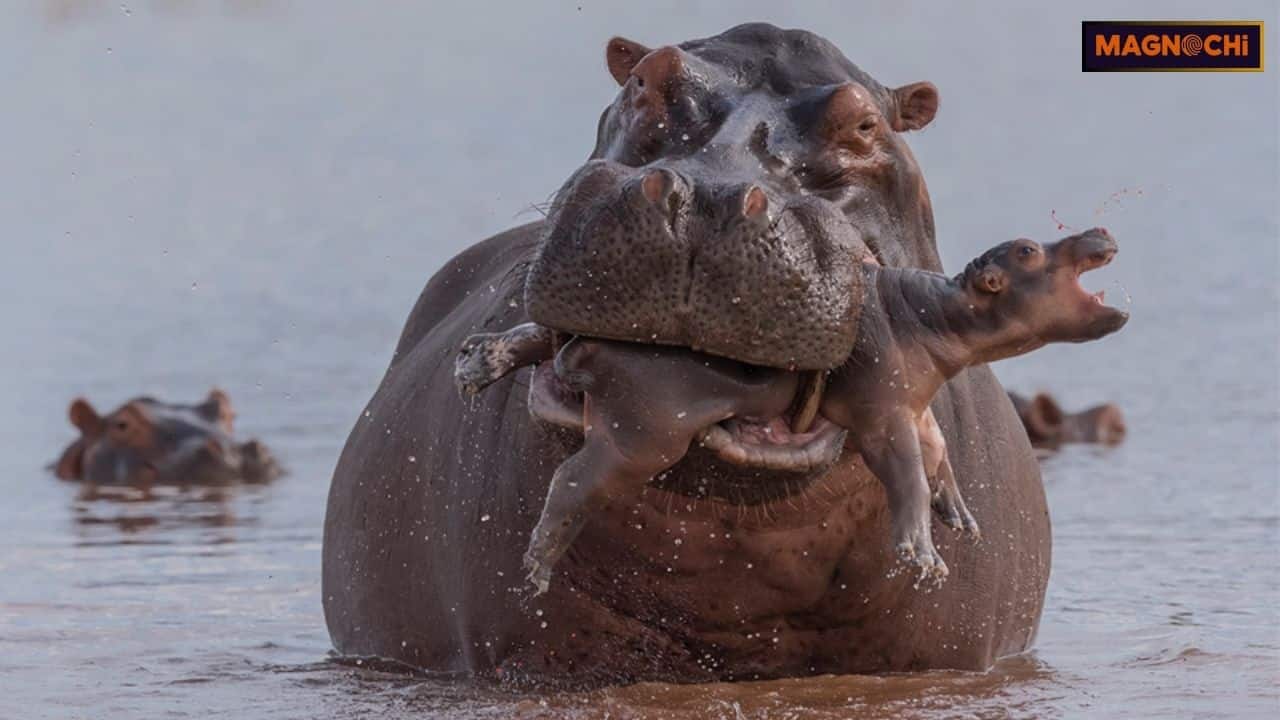Do Hippos Attack Humans? At first glance, they might seem like harmless, rotund creatures floating serenely in the waters of sub-Saharan Africa.
With their large mouths, tusks, and chubby bodies, they could easily be mistaken for slow-moving, docile giants. However, the truth is far more terrifying.
These animals, despite their somewhat comical appearance, are responsible for more human fatalities in Africa than some of the continent’s most feared predators, including lions, elephants, and crocodiles. Hippos kill around 500 people every year, making them one of the deadliest animals on Earth.
But why do these giant herbivores turn so hostile toward humans? Is it a natural defense mechanism, or are they simply unpredictable monsters?
In this article, we’re going to uncover the deadly secrets behind hippos’ behavior, understand why they attack, how you can avoid them, and much more.
What Are Hippos?
Before diving into the danger that hippos pose, let’s take a closer look at what these fascinating creatures are.
Hippopotamuses (often referred to as hippos) are large, semi-aquatic mammals native to sub-Saharan Africa. [Do Hippos Attack Humans?]
While their chunky bodies and large mouths make them appear slow and cumbersome, hippos are far more dangerous and agile than most people realize.
Physical Characteristics
- Size: Male hippos can weigh up to 4,000 pounds, while females usually weigh around 3,000 pounds. Despite their massive size, they are capable of running up to 30 miles per hour on land, a speed that would easily outrun a human.
- Mouth and Tusks: Hippos possess large, sharp tusks, which can grow up to 20 inches long. Their bite force is extremely powerful capable of crushing bones and causing fatal injuries.
- Skin and Behavior: Hippos have thick skin that helps protect them from sunburn and predators. They spend the majority of their day submerged in water to keep cool, emerging only at night to graze.
Diet
Despite their terrifying appearance, hippos are herbivores, meaning they only consume grass. They are capable of consuming up to 80 pounds of grass every night. [Do Hippos Attack Humans?]
This nocturnal feeding habit often brings them into closer proximity to human settlements, especially in areas where humans and hippos share water sources like rivers and lakes.

Why Do Hippos Attack Humans?
While hippos are herbivores, their behavior can turn aggressive in certain situations. Let’s break down the main causes of hippo attacks and the reasons they can pose a serious threat to humans.
Territorial Behavior: Hippos Are Protective of Their Space
Hippos are highly territorial animals, especially when it comes to water. [Do Hippos Attack Humans?]
They spend most of their time submerged in rivers, lakes, and swamps, and they fiercely defend these territories from perceived threats. This territorial aggression is one of the most common reasons for hippo attacks.
- In Water: Hippos are primarily aquatic animals, and they spend most of their time in the water. They can travel vast distances along rivers, lakes, and swamps to protect their territories. When humans or boats enter this space, hippos may feel threatened and become aggressive, charging at the intruder.
- On Land: Though hippos are most active in the water, they can be just as aggressive on land, especially when they are protecting their territory. The territorial instincts are not limited to their aquatic homes; they will defend their grazing grounds and burrows as well.
Defensive Instincts: Protecting the Calves
One of the strongest driving forces behind hippo aggression is the need to protect their young. Mother hippos are incredibly protective of their calves and will not hesitate to attack anyone or anything they perceive as a threat.
- Mother-Infant Bond: The relationship between a mother hippo and her calf is extremely strong, and the mother will go to great lengths to protect her offspring. If a human or a boat enters the proximity of a calf, the mother may charge to defend her young, even if no immediate threat is apparent.
- Aggression Triggers: The sight of an unfamiliar boat or person near her calf can trigger a defensive charge from the mother. While the mother’s aggression is usually a protective response, it can easily turn into a deadly encounter for unsuspecting humans who are not familiar with the hippo’s behavioral signals.
Mating Season Aggression: Hormonal Fury
Like many animals, hippos exhibit heightened aggression during the mating season. Male hippos are particularly territorial during this time, as they compete for dominance and access to females.
- Male Hippo Behavior: Male hippos will often engage in violent displays of aggression toward other males, and they will fiercely defend their territory. This means that during the mating season, hippos are more likely to attack humans if they feel their territory or mating rights are being encroached upon.
- Heightened Aggression: Males during the mating season become more aggressive in defending both their space and potential mates. This increased aggression makes hippos even more unpredictable during this time.
Are Hippo Attacks Dangerous? Understanding the Risks
While it’s true that hippos are responsible for hundreds of fatalities each year, it’s important to understand the nature of these attacks and the dangers involved.
Bite Force and Physical Power
A hippo’s bite is one of the most powerful in the animal kingdom. With a bite force of around 1,800 pounds, a hippo can easily crush bones, inflict deep wounds, and cause severe trauma.
Their large tusks, which can reach lengths of 20 inches, are also capable of causing fatal injuries.
- Crushing Power: A single bite from a hippo can crush bones, leading to fatal injuries. In addition to their powerful bite, hippos have immense physical strength, which allows them to easily flip boats or trample over humans in their path.
- Drowning Risk: In water, hippos can capsize small boats or attack swimmers. This is particularly dangerous in rivers and lakes where the visibility and escape routes are limited.
Statistics and Human Fatalities
It’s hard to imagine how a seemingly peaceful animal could be responsible for so many deaths, but the statistics are staggering.
Every year, hippos are responsible for more human fatalities than some of Africa’s most well-known predators. [Do Hippos Attack Humans?]
- Fatalities: Around 500 people are killed by hippos annually. This number surpasses the number of deaths caused by lions, elephants, and crocodiles. Hippos’ aggression, combined with their unpredictability and territorial nature, make them a significant danger to humans, particularly in Africa.
- Injuries: In addition to fatalities, hippos cause numerous serious injuries, including deep bite wounds, broken bones, and crush injuries. People who survive an attack often require extensive medical treatment and, in some cases, lifelong rehabilitation.

How to Avoid Hippo Attacks: Safety Tips for Humans
Despite the dangers, you don’t need to live in fear of hippos. By understanding their behavior and taking the right precautions, you can greatly reduce the risk of an encounter.
1. Respect Their Territory
The best way to avoid a hippo attack is to respect their territory. Whether you are boating, fishing, or simply enjoying nature, be mindful of the animals around you.
- Avoid Approaching Hippos: If you encounter a hippo while on land or in a boat, always give them plenty of space. Hippos will charge if they feel their space is being invaded, so staying a safe distance away is the key to safety.
2. Stay Safe While Boating
Boats are a common trigger for hippo attacks, especially in areas where humans and hippos share waterways. Here are some tips to stay safe while boating in hippo habitats:
- Use Larger Boats: Smaller boats are more likely to be capsized by a hippo. Larger, sturdier boats are less likely to provoke an attack and are safer in hippo territory.
- Stay Clear of Waterways at Dawn and Dusk: Hippos are more active at dawn and dusk, so avoid boating during these hours if possible.
3. Be Aware of Warning Signs
Hippos give subtle but clear signals when they are feeling threatened. Knowing these warning signs can help you avoid an aggressive encounter:
- Yawning: A hippo’s wide-open mouth may seem like a sign of relaxation, but it’s actually a warning of aggression.
- Grunting: Low, deep grunts can signal that a hippo feels threatened or annoyed.
- Splashing Water: A hippo will splash water with its tail as a sign of irritation. This is a clear sign that the animal is agitated and could attack if it feels further threatened.
4. Understand Hippo Behavior
Understanding hippo behavior and learning to recognize the signs of aggression can make all the difference in avoiding an attack.
Hippos are not inherently malicious, but they will fight back fiercely if they feel cornered or threatened. By recognizing their signs of distress and responding quickly, you can avoid triggering their aggression.

Final Verdict
The truth about hippos is that they are unpredictable. While they are not naturally aggressive, their territorial nature, defensive instincts, and heightened aggression during the mating season make them a significant threat in certain situations.
Hippos are responsible for more human deaths annually than many other larger and more traditionally feared animals in Africa. [Do Hippos Attack Humans?]
However, by understanding their behavior, respecting their space, and following safety guidelines, humans can safely coexist with these powerful creatures.
Hippos are vital to the ecosystem of Africa, and when approached with care and caution, it is possible to enjoy these majestic creatures from a distance without endangering your life.
FAQs
Why are hippos so dangerous?
Hippos are dangerous due to their immense size, powerful bite, and territorial nature. Despite being herbivores, they will aggressively defend their space, especially in water. Their massive jaws can crush bones with ease, and they are capable of running at high speeds on land. These factors make hippos one of Africa’s most lethal animals.
Can a hippo outrun a human?
Yes, hippos can outrun a human on land. They can reach speeds of up to 30 miles per hour, which is much faster than the average human running speed. Their surprising speed, combined with their strength, makes them incredibly dangerous if they charge. Always maintain a safe distance from them to avoid danger.
Are hippos aggressive to humans?
Yes, hippos can be very aggressive toward humans, especially if they feel threatened or their territory is invaded. They often act defensively, particularly in water, and will charge if they feel provoked. This aggression makes them one of Africa’s most dangerous animals. Staying at a safe distance is crucial to avoid conflict.
Can a human fight a hippo?
It’s extremely dangerous to try to fight a hippo. They are much stronger and faster than humans, with powerful bites and tusks. If attacked, your best chance of survival is to escape rather than confront them. Always respect their space to avoid dangerous encounters.
Will a hippo attack you if it sees you?
A hippo might attack if it feels threatened, but not always. They are territorial animals and can become aggressive if they perceive humans as intruders. If you get too close to their territory, such as rivers or lakes, they may charge. Keeping your distance is the safest approach.
Has anyone ever survived a hippo attack?
Yes, some people have survived hippo attacks, but it’s rare. Hippos cause severe injuries, including broken bones and deep wounds. Those who survive often require extensive medical treatment and may suffer from long-term physical effects. Early intervention and quick medical care improve the chances of survival.
What to do if a hippo is chasing you?
If a hippo is chasing you, try to find shelter or escape to higher ground. Hippos can run fast on land, so don’t attempt to outrun them. If near water, swimming to safety might be an option, but don’t rely on it if the hippo is already in the water. Avoiding hippo habitats reduces the risk.
Do hippos prey on humans?
No, hippos do not actively prey on humans. They are herbivores, feeding on grass and plants. However, they can be very dangerous if they feel threatened or cornered. Their territorial behavior often leads to deadly encounters with humans, but it’s usually out of defense rather than predation.
Conclusion: Do Hippos Attack Humans?
While hippos are not inherently violent, their aggressive nature when threatened, coupled with their territorial instincts, makes them one of Africa’s most dangerous animals.
By understanding their behavior and respecting their space, humans can avoid deadly encounters and safely appreciate these incredible creatures from a distance. [Do Hippos Attack Humans?]
Read more knowledgeable blogs on Magnochi









